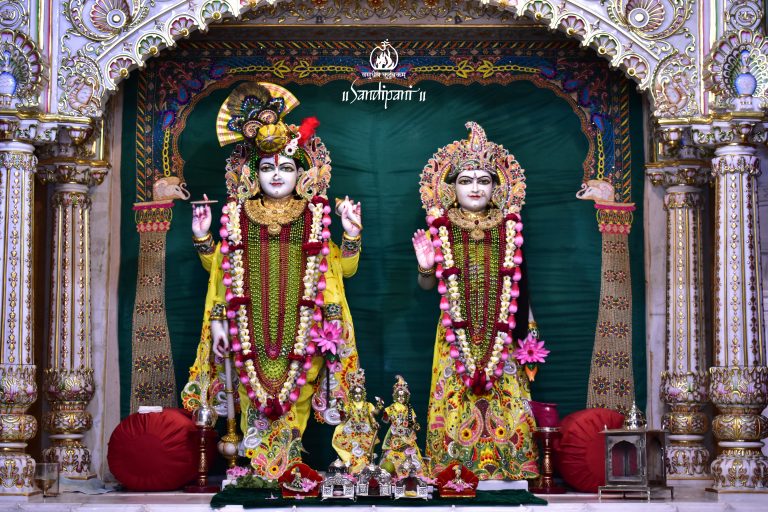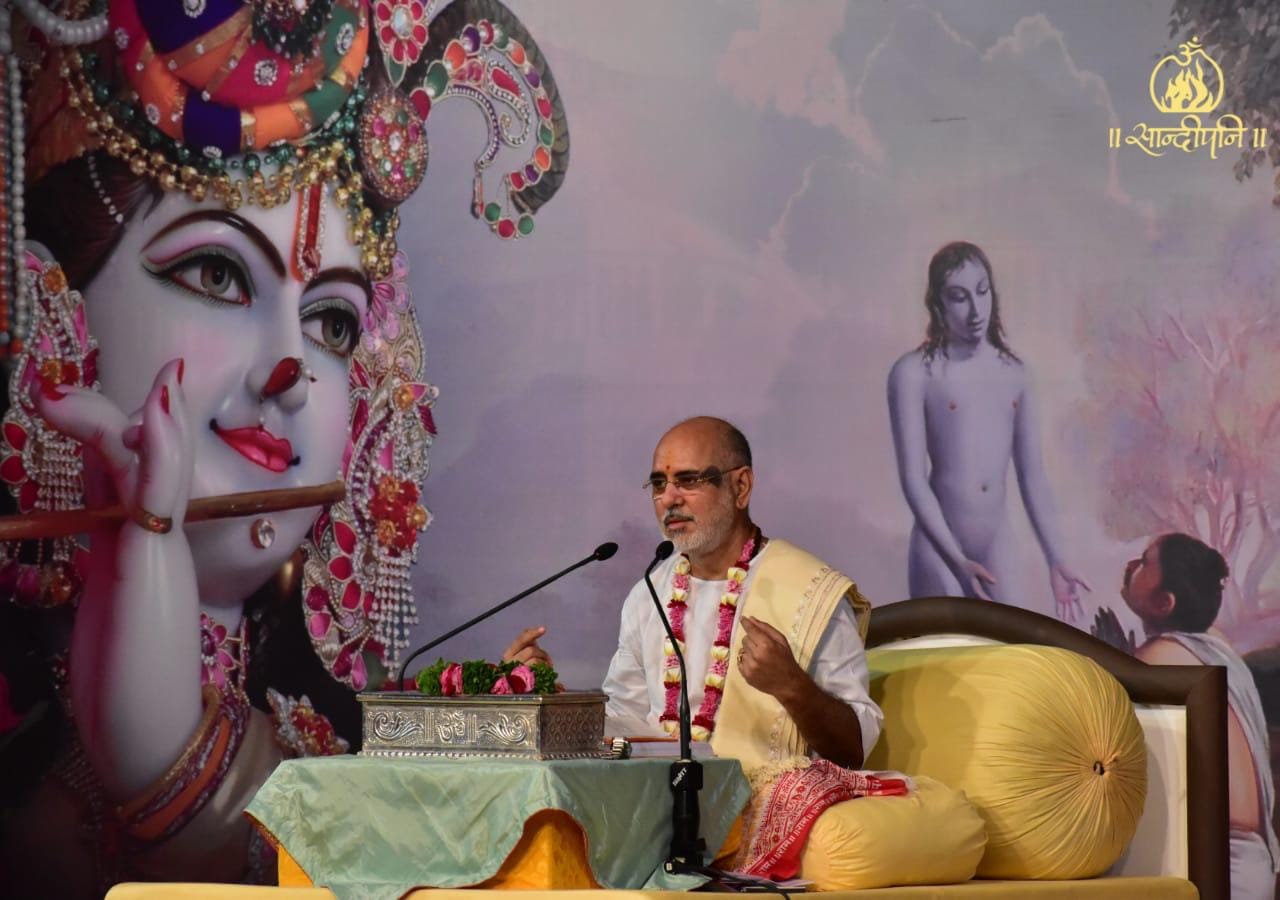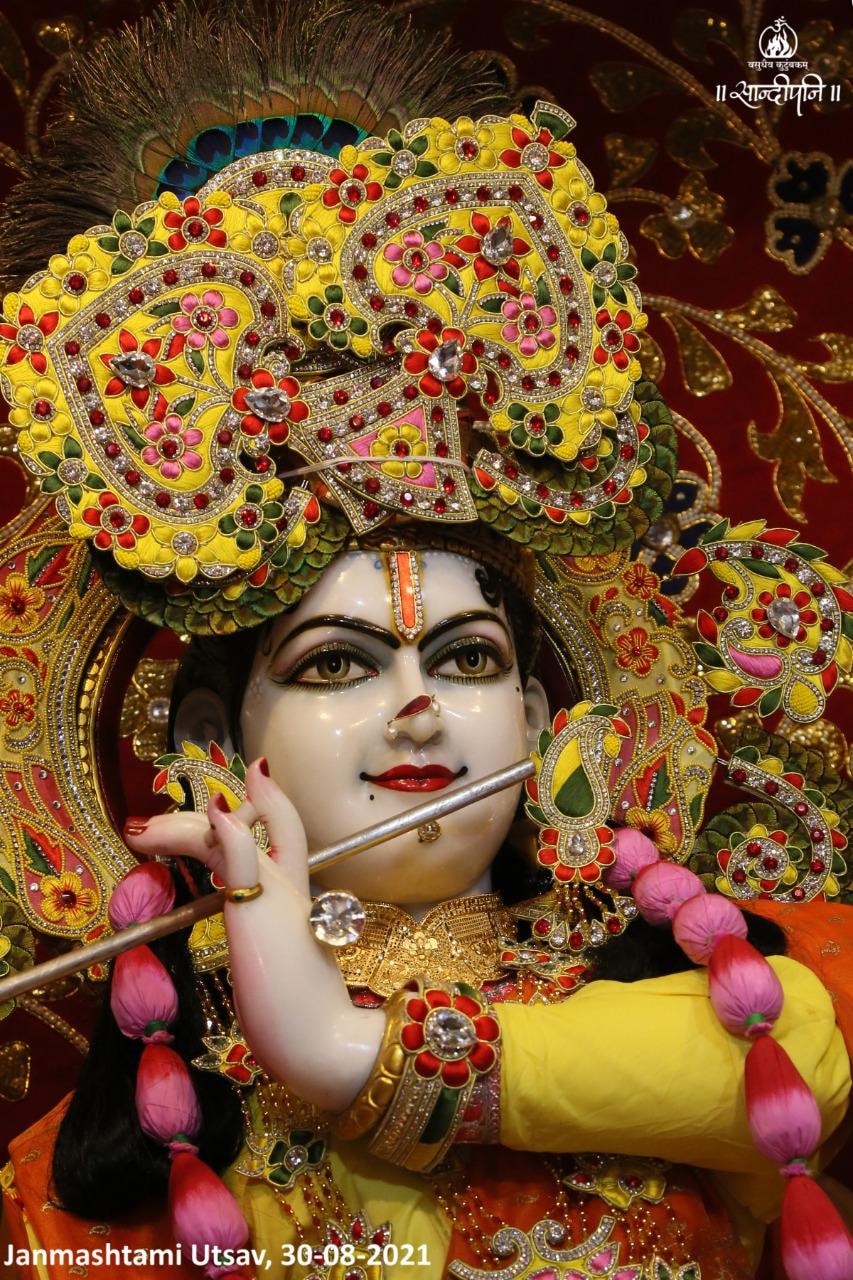Mokshada (Moksha) Ekadashi Vrat Katha
💙 Celebrate Gita Jayanti and accrue merits powerful enough to liberate all of one’s ancestors
⚪️ ShriHari Mandir (Porbandar) is celebrating Mokṣadā Ekādaśī fast on Tuesday, 14th December, 2021.
⚪️ This fast is observed on the eleventh day of the bright fortnight (Śukla pakṣa) of the month of ‘Mārgaśīrṣa’.
⚪️A special feature of this Ekādaśī is that it is observed on the universally celebrated festival of ‘Gitā Jayantī’ and also called by the same name.
⚪️ In this series of ‘Ekādaśī Vrata Kathā’, Lord of Lords ‘Devadeveśvara’ Śrī Krṣṇa, explains the name, method, main deity to be worshipped and the special significance of this fast, in response to the humble enquiry to learn, from Dharmarāja Śrī Yudhiṣṭhira Māharāja, in the ‘Uttara Khaṇḍa’ of the Padma Purāṇa.
⚪️ Addressing Māharāja Yudhiṣṭhira as the foremost amongst kings ‘nṛpaśreṣṭha’, Lord Krṣṇa shares the name of this specific auspicious lunar conjunction as “Mokṣā Ekādaśī”—which seizes and removes all accrued sins!
‘O, King, on the tenth and eleventh days known as Daśami and Ekādaśi, one should offer the fragrant frontal stem called the ‘manjari’ of the sacred Tulsi leaf along with a ghee lamp and fragrant incense to please Lord Dāmodara. This is the endearing form of Lord Krṣṇa who is boundless in essence yet accepts the bondage of loving devotion by His devotees, as seen when tied with a rope at his abdomen to a mortar by Mother Yaśodā.

⚪️ This Mokṣā Ekādaśī destroys the greatest of calamities. For the joy of the Lord, one should perform devotional dance, songs, and hymns whilst remaining awake through the night on this day. The Lord Himself says that
‘One whose ancestral manes have fallen to birth in lower species or lower spheres (due to the results of their own demerits), may all be liberated and elevated to heavenly spheres if they receive the merits of this fast from their descendants.’

⚪️ The story of this Vrata Kathā says that
☼ There was once a King called Vaikhānasa who ruled his kingdom from the extremely beautiful city of Campaka, which was adorned by the presence of devotees of the Lord. The king cared for his subjects as his own sons. Ruling in this munificent manner, the King once saw his ancestors living in a lowly species in his dream. The King was aghast to see them all in such a state and, upon waking, shared this dream in detail with the learned, wise Brāhmaṇas members of his Council.
☼ ‘O Brāhmaṇa Devtas, I have witnessed my ancestors to be fallen to the hellish regions! Piteously crying over and over again they pleaded with me as their offspring, to save them from the ocean of misery which they have fallen into! I am unable to rest easy after this experience—where shall I go and what shall I do now, as my heart is being crushed by the thought of their plight! Kindly instruct me with which form of fasting (vrata), asceticism (tapa) and path of union (yoga) I should observe to immediately liberate my manes from their suffering. Fie upon a son such as myself, whose parents suffer in hell, whilst their strong-armed and courageous son yet lives!’
☼ Hearing the King’s woeful submission, the Brāhmaṇas guided him to approach the great saint called Parvata Muni, whose sacred hermitage was nearby the capital city of Campaka and whose divine vision transcended the present to perfectly see both past and future as well. King Vaikhānasa immediately heeded this sound counsel and made haste to humbly lay prostrate before Parvata Muni.
☼ Laying bare his heart to the great hermit-saint, King Vaikhānasa acknowledged that by his grace, all seven limbs of his state were well-fortified. As per Rāja Dharma, of the code of conduct governing Kings, the seven limbs which are fortuitous for a successful leader are—
1. The King himself
2. King’s Ministers (council)
3. Kingdom (area of domain)
4. Fort (secure defense structure)
5. Treasury (capital)
6. Armed Forces (defense)
7. King’s Allies (friendships, alliances)
☼ Despite this good-fortune, the King was aggrieved to see his ancestors lying in hell and sought the hermit’s grace to learn which meritorious deeds (punya) could possibly be so powerful as to emancipate and uplift his fallen ancestors from there?
☼ Hearing this plea, Parvata Muni remained silent and entered into deep contemplation for a period of time spanning one muhurta, or 48 minutes. Emerging from this inner silence, the great Muni advised the King (and his family of well-wishers) to dutifully observe the great Mokṣā Ekādaśī fast, and collectively offer the merits accrued to their manes. They shall certainly be liberated by the might of the fruits of this fast.
☼ Thus, Śrī Krṣṇa continues to narrate the tale to King Yudhiṣṭhira of King Vaikhānasa return to his palace. When the most-excellent month of mārgaśīrṣa arrived, he obediently followed the prescribed method of observing the Mokṣā Ekādaśī fast and thereafter offered the merits of this deed to his deceased father, along with all his forefathers. No sooner had he done so, than a shower of flowers rained down upon him from the skies. His father and all ancestors were liberated from hell and appeared before him in the heavenly skies to shower auspicious blessings upon their great son and then depart for heaven!
☼ ‘O King, all the sins of one who similarly observes this glorious fast are destroyed and upon his death, he is liberated.’

⚪️ This Mokṣadā Ekādaśī grants Mokṣa (liberation) and is akin to the celestial wish-fulfilling gem for humans.
⚪️ Merely by listening to and narrating the significance of this Kathā, one achieves the merits of completing the celebratory soma Yajña called ‘Vājapeya’.
⚪️ Thus concludes the divine Mokṣā Ekādaśī Vrat Katha exchange between Śrī Krṣṇa and King Yudhiṣṭhira.
⚪️ This same Ekādaśī is celebrated as ‘Gītā Jayanti’. Come, let us observe this vrata, jāgarana and chanting of the Śrīmad Bhagavad Gītā to the best of our abilities in the bright fortnight of this sacred month of Mārgaśīrṣa, and make a true success of this day!

🌐 Stay tuned to know more about the respective significance of, rituals involved in, and fruits reaped from, each Ekādaśī Kathā!
🔆 #PujyaBhaishriSays—“One meaning of ‘Dharma’ is duty. By dutifully observing fasts such as Ekādaśī, etc, one’s mental purity and strength increases. This, in turn, increases our mental willpower to perform our duties. The result of performing Dharma is ultimately to develop love for the Lord.” @PPBhaishri.
🌙 #FunFact—There are two Ekādaśīs in every month; falling on the eleventh day of every lunar fortnight. The Ekādaśī falling during the waxing phase of the moon (bright lunar fortnight) is known as ’Śukla pakṣa’ Ekādaśī; and the one falling during the waning phase of the moon (dark lunar fortnight) is known as ‘Krṣṇa pakṣa’ Ekādaśī.
#PuraanPrasaad by Rishi Dhavalbhai Joshi
#mokshadaekadashi
#mokshaekadashi
#gitajayanti
#ekadashi
#vrat
#fast
#fasting
#Krishna
#Yudhishthira
#margshirsha
#puraan
#padmapuraan
#SandipaniVidyaniketan
#ShriHariMandir